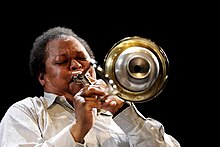George Lewis (trombonist)

George E. Lewis (born July 14, 1952 in Chicago , Illinois) is an American trombonist from the field of avant-garde jazz and Edwin H. Case Professor of Music at Columbia University in New York. Lewis is also active as a composer in the field of computer music, plays electronic instruments, sousaphone and tuba and is involved in art installations .
life and work
Thanks to a student scholarship for the Laboratory Schools designed by John Dewey at the University of Chicago , Lewis received good classes despite his poor background. a. also learned German. Lewis has been playing the trombone since the age of 9; he played in school bands partly together with his childhood friend Ray Anderson . At Yale , Lewis studied philosophy (B.A.) and played in the sextet of Anthony Davis during this time . In 1971 he took lessons at the Association for the Advancement of Creative Musicians (AACM) school, a. a. at Muhal Richard Abrams . In 1976 he played in the big band of Count Basie . He then became a member of the Anthony Braxton Quartet , with whom he also recorded as a duo and in an orchestra and in 1976 participated in the Wildflowers Loft Sessions . His album News for Lulu with John Zorn and Bill Frisell with their balancing act between bebop and free jazz is another milestone. Other important recordings were made with Evan Parker , Derek Bailey , Dave Holland , Randy Weston , Heiner Goebbels , Irène Schweizer and the Globe Unity Orchestra . Lewis has also toured Japan and Europe with Gil Evans .
Lewis has published more than 120 compositions. He performed his "interdisciplinary compositions" and his "interactive music videos", which combine different forms of expression in theater with the possibilities of video art and the technology of computer music, in Eastern and Western Europe, North America and Japan. Lewis improvises some of his compositions for computers on the trombone. His intermedia installations have been exhibited at the Randolph Street Gallery in Chicago and the Musee de la Villette in Paris . At the 6th International Conference on New Interfaces for Musical Expression (held in June 2006 at IRCAM , Paris), Lewis gave one of the main presentations.
After teaching at the University of California, San Diego , Mills College , the Art Institute of Chicago and Simon Fraser University , he was appointed to Columbia University in New York City in 2004 . In 2007 Lewis became director of the Center for Jazz Studies at Columbia University.
George Lewis is married to the koto player Miya Masaoka and has a son with her.
Awards (excerpt)
- 2002: MacArthur Prize for Creative Achievement, the "Genius Grant" ($ 500,000)
- Lewis won in the inter-arts category from the National Endowment for the Arts .
- In 2012 he received the SEAMUS Award
- In 2015 he was elected to the American Academy of Arts and Sciences .
- In 2016, Lewis was elected an external member of the British Academy .
- In 2018 he was elected to the American Academy of Arts and Letters .
Recordings (selection)
- George Lewis & Splitter Orchestra: Creative Construction Set ™ (2017)
- The Shadowgraph Series: Compositions for Creative Orchestra (Spool, 2003)
- Endless Shout ( Tzadik , 2000)
- Conversations (Incus, 1998)
- The Usual Turmoil and Other Duets ( Music & Arts , 1998) with Miya Masaoka
- Transition & Transformation (Nine Winds)
- Changing With The Times (New World, 1993) with Bernard Mixon
- Chicago Slow Dance (1977) (Lovely Music, 1981)
- Homage to Charles Parker ( Black Saint , 1979)
- Solo Trombone Album (Sackville, 1976)
Publications
- George Lewis: Improvised Music after 1950: Afrological and Eurological Perspectives. Black Music Research Journal 16 (1996): 91-122.
- George Lewis: Too Many Notes: Computers, Complexity and Culture in Voyager. In: Leonardo Music Journal 10 (2000): 33-39.
- George Lewis: Experimental Music in Black and White: The AACM in New York, 1970-1985. In: Current Musicology 71-73 (spring 2001 – spring 2002): 100-157.
- George Lewis: Afterword to "Improvised Music after 1950" In: Daniel Fischlin & Ajay Heble (Eds.) The Other Side of Nowhere. Jazz, Improvisation, and Communities in Dialogue Wesleyan University Press, Middletown CT, 2004, ISBN 0-8195-6681-0 , pp. 163-172.
- George Lewis: A Power Stronger Than Itself: The AACM and American Experimental Music. University of Chicago Press, Chicago 2008, ISBN 978-0-226-47695-7 .
Web links
- Official site of George Lewis at Columbia University
- “Experimental is not a category” , the daily newspaper , August 27, 2007
| personal data | |
|---|---|
| SURNAME | Lewis, George |
| ALTERNATIVE NAMES | Lewis, George E. |
| BRIEF DESCRIPTION | American jazz trombonist and composer |
| DATE OF BIRTH | July 14, 1952 |
| PLACE OF BIRTH | Chicago , Illinois |

